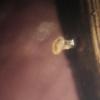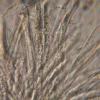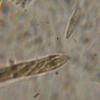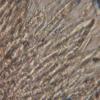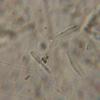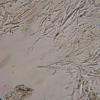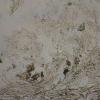
29-11-2024 21:47
Yanick BOULANGERBonjourJ'avais un deuxième échantillon moins mat

27-02-2026 17:51
 Michel Hairaud
Michel Hairaud
Bonjour, Quelqu'un peut il me donner un conseil p

27-02-2026 16:17
 Mathias Hass
Mathias Hass
Hi, Found this on Betula, rather fresh fallen twi

27-02-2026 12:56
Åge OterhalsFound on fallen cones of Pinus sylvestris in midle

27-02-2026 11:21
 Yannick Mourgues
Yannick Mourgues
Hi to all. Here is a specie that can may be relat

26-02-2026 15:00
Me mandan el material seco de Galicia, recolectada

24-02-2026 11:01
Gernot FriebesHi,found on a branch of Tilia, with conidia measur

23-02-2026 11:22
Thomas Læssøehttps://svampe.databasen.org/observations/10584971

Dear friends,
There is one more tiny discomycete collected on thin branch. I examined this specimen in statu vivo (at least, it was not dry).
Fruitbodies light orange, stalked, disc 0,5-0,8 in diam.
Asci IKI Blue
Spores elongated, 15-19-2,7-3,7 um, sometimes 1-septate, non-guttulate or sometimes with several small guttules.
Paraphyses with many septae (or with large guttules which make impression of septae), the apical cell is often non-guttulate, but in the lower part there are many small guttules.
Also there are excipular(?) hyphae which contain some crystalline or dense substance.
Is it some species of Helotium of Phialea?
These inoperculates are really difficult(
With best wishes,
Irina

And are you sure this is a woody stem? Not herbaceous.
I can only guess for Cyathicula cyathoidea.
Phialea and Helotium are very old genera, not used anymore.
Zotto

I have 2 apothecia.
Yes, the stem is probably herbaceous.
Irina

Zotto
La taille des spores est 15-20 x 3-4µm.
la couleur de l'apothecie varie de jaune pâle à orange et même rose.
Toujours sur herbacées.
Amitiés
Didier
I think that it is about crocicreas coronatum not tres typical = without teeth.
The size of spores is 15-20 x 3-4µm.
The color of the apothecie varies of light yellow in orange and even pink.
Always on herbaceous.
Best regards
Didier?

Zotto

Zotto,
Ok, I'll do it on Monday and show the photo
Irina

It's a pity, but the last fruitbody I had was infected by some mould fungus and I see mostly alien hyphae in preparation:(
By the way, I like the idea about teethless C. coronatus.
Sincerely,
Irina
